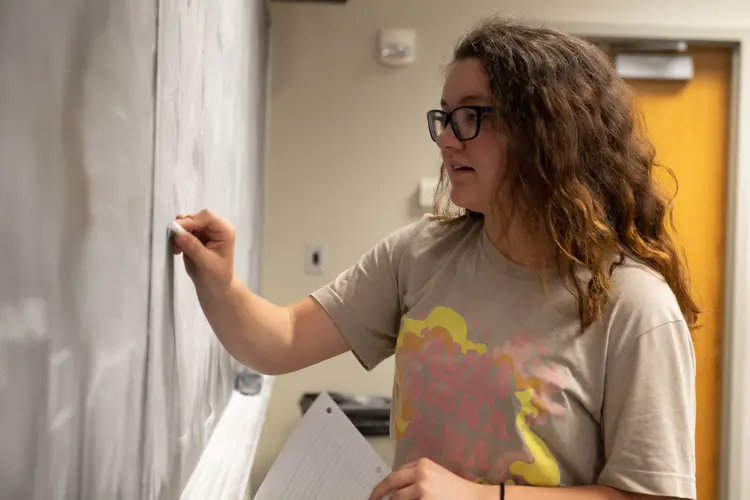All About Qualified Mathematics Educators: Their Function in Fostering Pupil Development and Accomplishment in Mathematics Education
Qualified math educators are necessary in shaping trainees' understanding and admiration of mathematics. Their deep understanding and effective training techniques can considerably affect student outcomes. These instructors not just impart mathematical skills yet additionally promote an inclusive atmosphere that meets varied discovering requirements. As they embrace cutting-edge approaches, the question arises: how do these approaches particularly improve student interaction and success in math?
The Value of Competent Math Educators in Education And Learning
Although many aspects add to trainee success in maths, the existence of qualified mathematics educators attracts attention as an important element in cultivating efficient knowing settings. Study continually suggests that students shown by teachers with strong mathematical histories tend to show higher degrees of understanding and achievement. Certified mathematics instructors not only have a deep understanding of mathematical concepts but also the instructional abilities required to communicate complex ideas in accessible means. They can determine pupils' private demands and adapt their training methods appropriately, advertising inclusivity and interaction. In enhancement, their experience enables them to produce a favorable class ambience that encourages risk-taking and strength in analytic. This supportive atmosphere cultivates a growth attitude among pupils, boosting their self-confidence and motivation in mathematics. On the whole, certified mathematics instructors play a vital duty in shaping trainees' mindsets toward math, ultimately influencing their academic trajectories and future opportunities.
Trick High Qualities of Effective Math Educators
Reliable math instructors possess a number of key top qualities that enhance their mentor performance. These consist of deep subject knowledge, strong interaction skills, and flexible teaching techniques that provide to diverse discovering requirements. Recognizing and cultivating these characteristics can significantly affect pupil understanding and engagement in mathematics.
Deep Topic Expertise
While a strong pedagogical strategy is essential, deep subject expertise continues to be a keystone of efficient math instructors. Such understanding enables educators to understand mathematical concepts thoroughly and to expect student misunderstandings. Educators with a strong grasp of mathematics not just deliver material with confidence but additionally link various topics, promoting a richer discovering environment. They are outfitted to apply diverse mentor approaches that satisfy various discovering designs, making intricate ideas extra accessible. Deep subject expertise equips instructors to involve in purposeful conversations with trainees, urging critical thinking and problem-solving abilities. Inevitably, the depth of recognizing that mathematics teachers have substantially affects pupils' academic growth and accomplishment in maths, laying a strong structure for future knowing.

Strong Interaction Skills
Deep subject knowledge alone wants for promoting a productive understanding environment in mathematics; strong interaction abilities are just as vital for reliable mathematics instructors. These abilities make it possible for educators to communicate intricate ideas in accessible methods, ensuring that trainees realize foundational ideas. Efficient communication entails not just clearness however also the ability to proactively listen, encouraging trainee involvement and attending to false impressions. By promoting an open dialogue, educators produce a supportive class ambience where students really feel comfortable asking inquiries and expressing their thoughts. In addition, strong communicators can adjust their language and explanations to match diverse knowing designs, improving pupil involvement and understanding. Inevitably, effective communication bridges the gap in between a teacher's knowledge and a trainee's understanding, significantly affecting scholastic success in maths.
Adaptive Teaching Methods
A selection of flexible teaching techniques are essential for reliable math teachers aiming to fulfill the diverse requirements of their pupils. These methods make it possible for teachers to tailor their direction based upon specific knowing capacities, styles, and interests. qualified math teachers. Strategies such as separated instruction, where teachers change content, procedure, or item, aid address varying efficiency levels. Additionally, including technology and interactive devices can boost engagement and facilitate individualized knowing experiences. Formative assessments allow instructors to keep track of development and adjust training methods as necessary. Collective group work promotes peer discovering, promoting a supportive setting. By utilizing these flexible methods, math instructors can produce inclusive class that motivate all students to thrive and achieve their academic goals, eventually promoting a love for maths
Ingenious Training Techniques Utilized by Mathematics Educators
As educators seek to engage students better, cutting-edge mentor approaches have actually emerged as a prime focus in mathematics classrooms. These approaches aim to improve understanding and retention of mathematical ideas. One prominent technique is using modern technology, such as interactive software application and online simulations, which allows pupils to visualize intricate problems and get immediate feedback.Additionally, project-based discovering motivates partnership and real-world application of mathematics concepts, cultivating crucial assuming skills. Gamification, where mathematics concepts are integrated into game-like settings, has actually additionally acquired appeal, making finding out more pleasurable and inspiring for students.Moreover, differentiated instruction tailors lessons to suit varying ability levels, guaranteeing that all students can advance at their very own rate. By using these ingenious methods, mathematics instructors create dynamic discovering experiences, eventually advertising better pupil development and success in maths.
Producing Inclusive Knowing Environments
Producing inclusive understanding environments in mathematics education and learning involves carrying out varied discovering strategies and promoting collective group activities. These methods provide to the varied requirements of students, ensuring that every person has the chance to succeed and engage. By prioritizing inclusivity, math educators can cultivate a class environment that supports all learners.
Diverse Discovering Approaches
While several instructors endeavor to promote comprehensive knowing settings, carrying out varied understanding approaches is crucial for efficiently reaching all pupils. These methods encompass a variety of training techniques customized to accommodate differing learning histories, styles, and capabilities. For instance, including visual help, manipulatives, and modern technology can engage students that may struggle with typical instruction. In addition, set apart direction permits instructors to customize assessments and projects, making sure that every trainee can access the educational program at their own level. Culturally receptive rearing additionally plays a considerable duty in recognizing and valuing the diverse experiences of trainees, thereby improving their connection to the product. By making use of these diverse discovering approaches, certified math teachers can produce an encouraging environment where all pupils are encouraged to succeed in mathematics.
Collaborative Group Activities

The Impact of Qualified Math Teachers on Trainee Accomplishment
The existence of qualified mathematics instructors significantly influences trainee success, as reliable guideline can connect voids in understanding and foster a positive knowing atmosphere. Research suggests that students shown by experienced educators show higher levels of efficiency in mathematical ideas compared to their peers. Qualified mathematics instructors possess a deep understanding of mathematical material, enabling them to existing material in varied ways that accommodate numerous discovering styles. This flexibility not just boosts comprehension yet additionally enhances trainee confidence in their abilities.Moreover, certified teachers usually utilize developmental evaluations to monitor trainee progression, enabling timely treatments when essential. Their ability to develop appealing lessons encourages pupil involvement and promotes a growth frame of mind. Therefore, the impact of certified math educators extends beyond plain academic performance; it cultivates a sense of interest and resilience in pupils, ultimately leading to enhanced outcomes in maths and a stronger foundation for future learning.
Techniques for Engaging Students in Mathematics
Engaging trainees in mathematics needs a diverse approach that incorporates varied techniques to catch their interest and improve understanding. One efficient approach is the use of real-world applications, enabling pupils to see the relevance of mathematical principles in day-to-day life. Including modern technology, such as interactive go software program and on the internet sources, can additionally cultivate engagement by giving vibrant knowing experiences.Group job encourages collaboration, making it possible for students to gain from one another and develop analytical abilities in a helpful setting. In addition, integrating games and hands-on activities can make finding out more accessible.differentiated and delightful guideline provides to various learning styles, making sure that all pupils can connect with the material. Offering prompt responses assists trainees recognize their development and areas for improvement, fostering a development attitude. By employing these approaches, educators can develop an appealing math class that promotes pupil development and accomplishment.
The Role of Specialist Advancement in Enhancing Mathematics Mentor Abilities
While numerous educators identify the value of reliable mentor methods, expert development plays an essential duty in improving mathematics mentor skills (qualified math teachers). Continuous training possibilities enable educators to remain present with pedagogical advancements, mathematical material, and technical tools. Workshops and workshops give discussion forums for educators to team up, share best techniques, and go over difficulties they come across in the classroom.Furthermore, professional growth cultivates a development attitude amongst educators, urging them to review their practices and adapt their strategies based on student requirements. This ongoing discovering process not just improves educators' mathematical understanding but likewise furnishes them with cutting-edge instructional methods that can lead to improved trainee interaction and achievement.Ultimately, an organized expert development program can greatly influence the quality of mathematics education and learning, making sure that instructors are well-prepared to motivate and assist their pupils towards success in mathematics
Frequently Asked Concerns
What Credentials Are Needed to End Up Being a Mathematics Educator?
To become a math instructor, people usually require a bachelor's level in mathematics or education and learning, teaching qualification, and a strong understanding of mathematical principles. Added qualifications may include specialized training in rearing and class administration skills.

Exactly How Do Mathematics Teachers Assess Trainee Progression in the Class?
Math educators evaluate trainee progression via various techniques, consisting of quizzes, examinations, and projects (qualified math teachers). They also make use of empirical assessments and student engagement to determine understanding, readjusting direction based on specific and team efficiency to enhance learning outcomes
What Difficulties Do Mathematics Educators Commonly Face?
Mathematics instructors frequently encounter challenges such as differing student skill degrees, limited sources, curriculum constraints, and the need to engage students properly. In addition, they usually run into pressure to improve standard examination ratings and take care of class habits.
Exactly How Can Parents Support Their Child's Math Education and learning?
Parents can support their kid's math education by supplying a conducive discovering atmosphere, involving in math-related activities, motivating a favorable attitude towards challenges, and preserving open communication with teachers to monitor progress and address worries.
What Resources Are Offered for Math Educators to Boost Their Skills?
Different resources are available for math educators, consisting of on-line programs, expert advancement workshops, peer partnership teams, educational internet sites, and training journals. These tools improve educational techniques, strengthen subject understanding, and inevitably boost pupil understanding outcomes in mathematics. Qualified mathematics teachers are crucial in forming trainees' understanding and recognition of maths. Many variables add to student success in mathematics, the visibility of qualified math instructors stands out as a vital element in promoting efficient discovering atmospheres. Furthermore, qualified math educators help with these communications by tactically grouping trainees, making certain that each team consists of a mix of ability degrees and backgrounds. The presence of qualified math teachers considerably affects pupil success, as effective direction can link voids in understanding and cultivate a favorable learning environment. Math teachers commonly deal with difficulties such as differing pupil skill levels, minimal sources, curriculum restraints, and the demand to engage students properly.